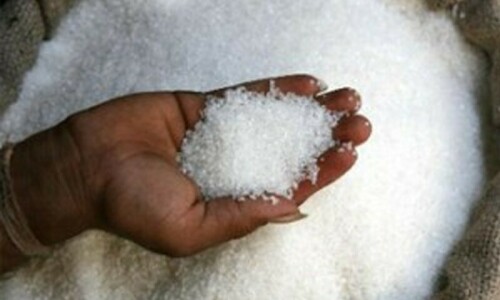
Pakistan is the 7th largest producer of sweetener in the world, and sugarcane is the country’s second most important cash crop after cotton. The country produced 7.8 million tonnes of sugar in the crop year 2021-22 (the highest-ever volume). Its per hectare cane yield is 46 tonnes, around 14 tonnes less than the world average of 60 tonnes.
Sugar output in the country declined year-on-year from 2016-17 to 2019-20. However, the next two consecutive seasons saw an increase in the output because of a somewhat better yield and a significant increase in the crop acreage, coupled with a surge in the minimum sales price and a more empowered cane commissioner in Punjab, ensuring full and timely payments to the growers. This led to sugar production of 2m tonnes more than expected in 2021-22.
Like wheat, sugarcane is also a political crop, and the federal government is heavily occupied with the sugar industry. It regulates the commissioning of a factory, trade, and sweetener prices, thus influencing crop growers’ decisions in one way or another.
It also controls the import and export of sugar to maintain prices in the domestic market at a “reasonable” level. In this context, the millers have had to lobby hard with the government to export 0.25m tonnes in 2022-23.
Owing to the surplus sugar stock, selling prices are currently below the cost of production, which may lead to losses for the sector
The sugar industry began its crushing season for 2023-24 with a carryover stock of 0.7m tonnes. The total sugar production in the year is over 6.84m tonnes (6.76m tonnes from cane and 80,000 from beet) taking the total available stock to over 7.54m tonnes. In view of the projected domestic consumption of 6.1m tonnes for the ongoing year, the country will have around 1.5m tonnes surplus.
The millers petitioned the government for months to export at least 1 million tonnes of the surplus to earn around $1.2 billion in foreign exchange. They called for a policy of exporting the surplus sugar in two instalments without any subsidy so that the exchequer could get the best benefit from the good prices in the international market.
They argued that India’s focus on manufacturing value-added goods rather than exporting sugar created a demand-supply gap in the international market, and the government should take advantage of this opportunity to export surplus sugar. Through all the lobbying, the industry managed only to win permission to export 0.15m tonnes, as the government feared the export could lead to price escalation in the domestic market.
This fear was not that far-fetched. Last year, Pakistan exported 0.249m tonnes of sugar during the February-June period, causing a surge in domestic retail prices. The sugar industry had been demanding permission to export surplus volumes since March 2022, when the price was Rs80-85 per kg, but the PMLN-led coalition government allowed it in February 2023, leading the price to increase to Rs150 per kg in July.
The mill owners earned Rs29.1bn ($104.52m) through exports at the cost of consumers, who were left with no option but to procure the commodity at almost double the prices prevailing before the government decided to allow foreign sales of sugar. The sugar prices, however, declined later with the start of the new cane-crushing season.
According to a commerce ministry report, net sugar consumption stood at over 5m tonnes, and a Rs1 per kg increase means a net Rs5bn transfer of resources from consumers to the millers. In April earlier this year, domestic sugar prices also rose by Rs10 to Rs150 per kg in different parts of the country amid reports that the millers pressured the government to allow exports. However, the industry argues that the meagre export of 0.15m tonnes out of a 1.5m tonne surplus of sugar will create massive problems for the sector in the coming season.
An official of the Pakistan Sugar Mills Association (PSMA) says that the situation will become disastrous when a huge carryover stock coupled with next year’s surplus of an estimated 2-2.5m tonnes will pile up at the factories and storage since the government had set a sugar production target of 7.6m tonnes for the new season.
Requesting not to be named, the PSMA official claims that because of surplus sugar stock, the selling prices are currently below the cost of production. As a result, there will be massive losses for the industry and bank defaults on working capital loans. Resultantly, around 40 sugar mills might not be able to operate in the forthcoming crushing season, and the sugarcane farmers will not get their deserved prices and timely payments.
“Mismanagement by the government in fear of domestic price increases because of exports will create an ugly situation,” he adds. The official further explains that 90 per cent of sugar is consumed industrially, while households mostly use it for tea. Around Rs25.5 of federal taxes are levied on each kilogramme of sweetener, and the government, instead of exempting households from taxes, is controlling sugar prices for the benefit of industrial consumers, disturbing the whole sugar value chain.
Published in Dawn, The Business and Finance Weekly, July 22nd, 2024













































Dear visitor, the comments section is undergoing an overhaul and will return soon.